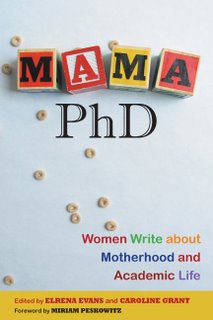CFP: Mothers Creating/Writing Lives: Motherhood Memoirs
January 28th, 2009UPDATE: EXTENDED DEADLINE APRIL 15, 2009
Mothers Creating/Writing Lives: Motherhood Memoirs
As memoir continues to expand in popularity, motherhood memoir has become an increasingly prominent and lucrative subgenre for contemporary authors. As Michelle Herman points out in The Middle of Everything: Memoirs of Motherhood, if forced to choose between her daughter and her writing, she would choose her daughter, but this would be a gut-wrenching decision. Instead, her writing life is woven into her mothering life, and she finds that she can write in conditions she would have previously thought impossible. It is clear that writers who are also mothers must write their stories. How do they do it, why are so many readers interested in what they have to say, and what can we learn from them? Women have been writing about motherhood as long as they have been writing, but the contemporary shift to tell-all memoirs has changed the rules of writing about mothering, and perhaps, of mothering itself.
We are seeking proposals for a collection that will interrogate and critique the motherhood memoir. In addition to a new collection entitled Mama Ph.D.: Women Write about Motherhood and Academic Life, there are several very recent motherhood memoirs that demand critical attention, works such as: Adrienne Martini’s, Hillbilly Gothic: A Memoir of Madness and Motherhood; Susan Johnson’s, A Better Woman; Ayun Halliday’s, The Big Rumpus; and Anne Roiphe’s, Living Contradictions: A Memoir of Modern Motherhood. What are these and other writing mothers saying about the experience of mothering today? What, if any, universals are present in motherhood memoirs? What societal critiques and suggestions provide the bedrock for potential revolutionary parenting practices? This collection will strive to bridge the distance between writing mothers who are critics and writing mothers who are authors by privileging academic work that seeks to discuss and contextualize motherhood memoirs beside authors’ own experiences of mothering, academic life, and writing. Autotheoretical works are encouraged, as are works that seek to meaningfully compare contemporary motherhood memoirs with those written in other eras, or works which thematically explore a grouping of memoirs. For example, one might discuss the role of fathers, special needs children, mothering and mental illness, etc. in several volumes, particularly if these topics inform the author’s own experiences. Other possible topics include the range of issues related to choice (the choice of whether/when/how to mother, etc.), mothering and socioeconomic class, mothering and race, mothering at different ages, mothering and prose/poetic form, mothering and sexuality, and other topical themes.
Please send one to two page proposals and a curriculum vitae to Justine Dymond, jdymond AT spfldcol DOT edu , and Nicole Willey, nwilley AT kent DOT edu, by April 15, 2009.


 Join us on Facebook
Join us on Facebook